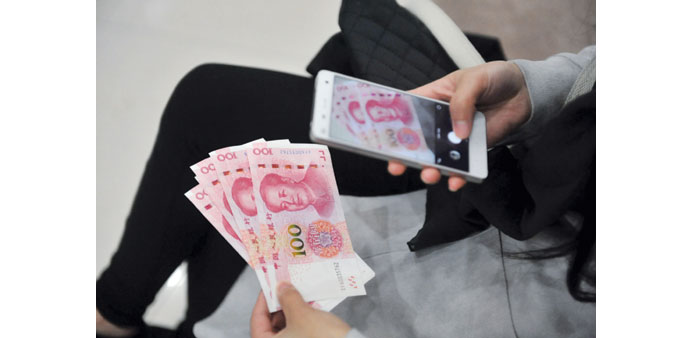A woman takes pictures of new 100 yuan banknotes she withdrew from a bank in Hangzhou, Zhejiang province. Some bank ATMs have rejected the notes when people tried to deposit it.
AFP
Beijing
China’s new 100-yuan banknote, acclaimed by authorities as bearing high-tech features that make it harder to forge, is being rejected by cash machines, a report said yesterday.
The red note, emblazoned with a portrait of Communist China’s founder Mao Zedong, is worth just under $16 and remains the highest denomination available in the country.
It went into circulation on Thursday and has been dubbed the “high-roller gold” for the colour of its main “100”.
It has more security features than previous notes, the government said, to make it “easier for machines to read” and “more convenient for the public to distinguish authentic notes from fake ones”.
But some banks’ automatic teller machines (ATMs) would not accept the new money when people tried to deposit it, reported the East Asia Economic and Trade News in the northeastern city of Changchun.
A bank executive said it will take several days for all ATMs to be “upgraded” to recognise the new note, it said.
Residents also complained that supermarkets rejected the bills as counterfeit detection machines consistently sounded alarms when presented with the note, the paper said.
“Come back another day if you want to spend it – we dare not to take the note before the verifier gives the nod,” the report cited a supermarket employee as saying.
Counterfeiting is rampant in China with the country’s own currency no exception, despite numerous crackdowns by authorities.
Police in the southern province of Guangdong announced in September that they seized piles of forged 100-yuan banknotes with a face value of 210mn yuan in a raid, according to reports.
Money counting machines are ubiquitous in Chinese shops, where customers making large purchases in cash need to use wads of notes to pay.
The government has intentionally kept the denomination of Chinese legal tender low to “curb both counterfeiting and corruption”, the official Xinhua news agency said on Thursday.

